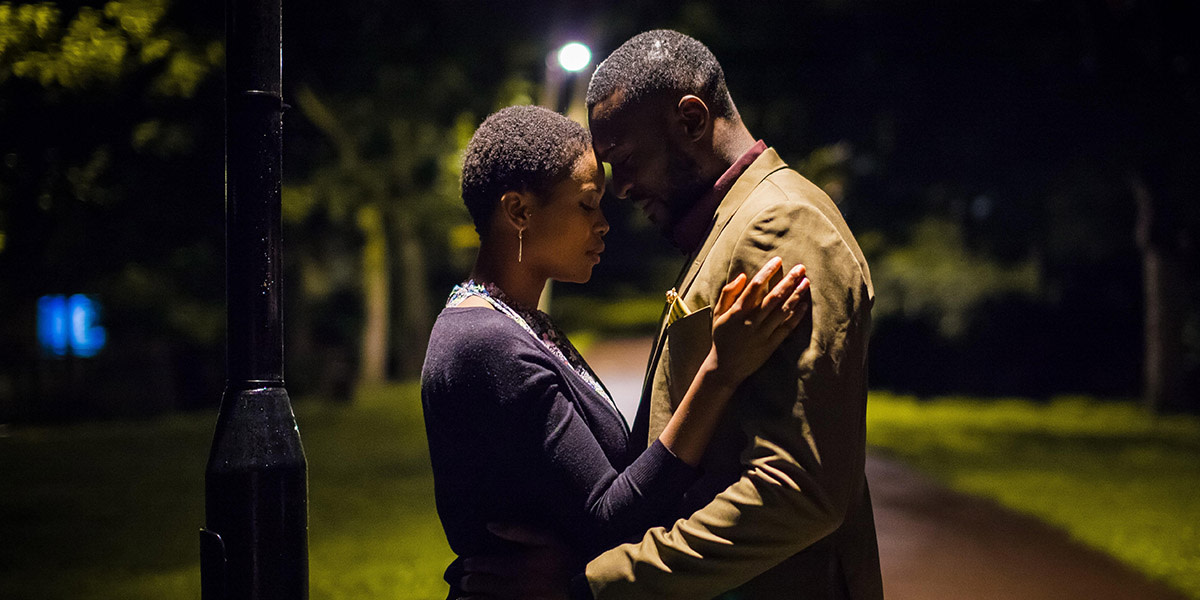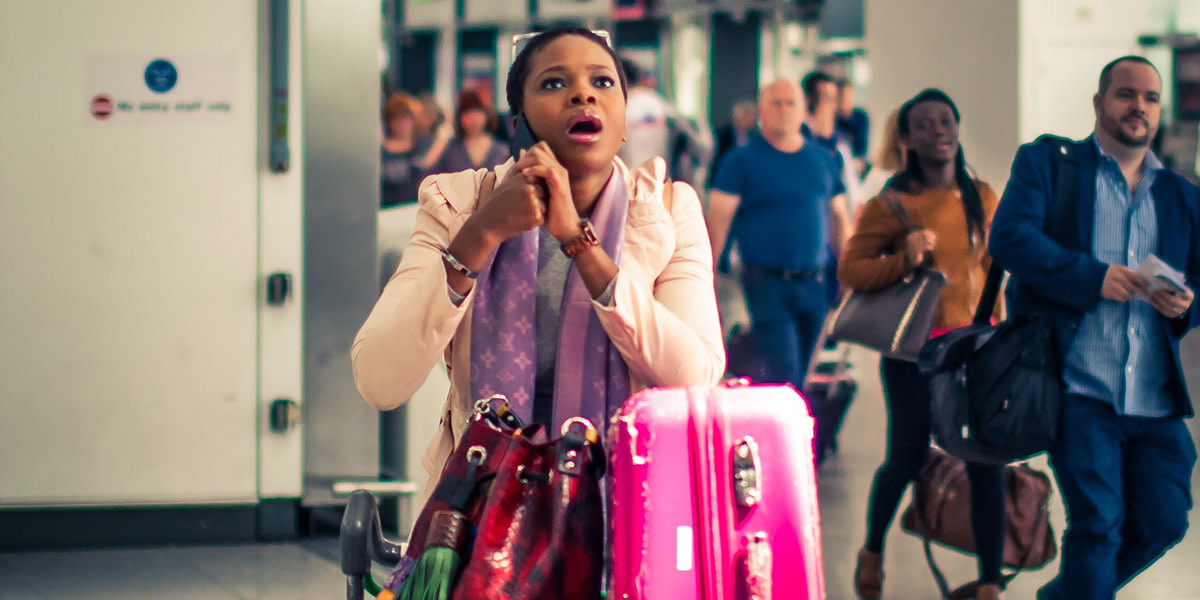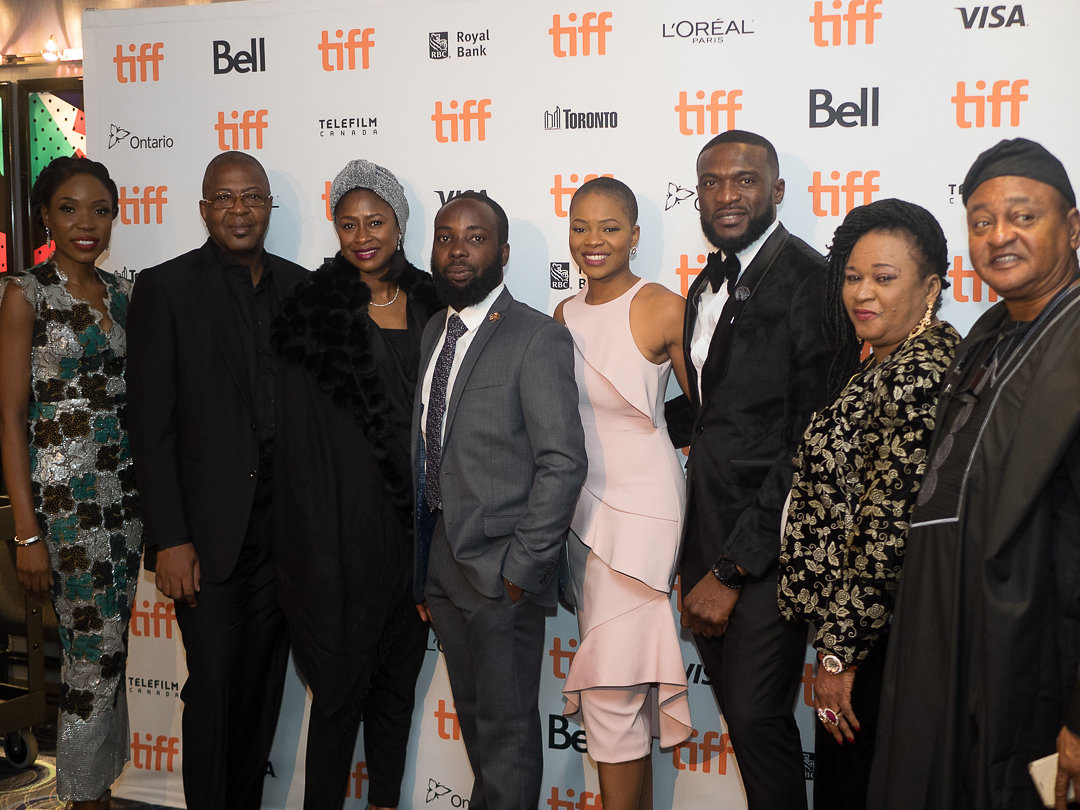MOVIES
THE ROYAL HIBISCUS HOTEL (RHH): A REVIEW by DR DOYINSOLA ABIOLA
Published
7 years agoon
By
FAB
The latest offering from EbonyLife Films, The Royal Hibiscus Hotel, is a ‘blooming’ love story, purposefully crafted for universal viewing. Its first screening was for a critical audience at the Toronto International Film Festival (TIFF), creating considerable buzz for its subsequent premiere in Lagos, Nigeria on 4th February.
Contextually, the film weaves a love theme, with a mixture of local and universal flavours, craftily packaged for a global audience. Its cinematography highlights the familiar sites and sounds of the mega-city of Lagos; setting the scene for its universal appeal.
The storyline is a familiar one of the twists and turns between two young lovers, Ope (Zainab Balogun), a ‘returnee’ trained chef from abroad, and Deji (Kenneth Okolie), a suave, successful entrepreneur. Their courtship is spiced with sub-themes revolving around various supportive and meddling characters.

EbonyLife Films’ Royal Hibiscus Hotel was Nigeria’s successful submission at the film festival. Living up to the import of being Nigeria’s ambassador at the TIFF, it paraded a list of current, notable Nigerian actors, displayed a well-executed theme of love and scaled the critical test amongst equals. It flew the Nigerian flag as a testimony of our long and notable history of theatre arts excellence, which encompasses drama, dance, artistes and playwrights – the most recognised of which is Nobel Laureate, Prof. Wole Soyinka.
However, the food for thought, provided by The Royal Hibiscus Hotel and relevant to the current state of our performing arts, is consistency in production quality, in order to remain a competitive regional/global player. A starting point is a mindset like Mo Abudu’s, which employs filmmaking as a viable commodity of exchange in the regional and international entertainment business grid. The current wave of revival, surging through Nigerian filmmaking and the performing arts, must be encouraged and sustained through purposeful patronage of both.

Significantly, the real import of The Royal Hibiscus Hotel goes beyond its entertainment value. A reality check shows that, in spite of the mushrooming of Nigerian embassies globally, our membership in international and regional bodies, and our vast population with natural existential diversities, Nigeria is largely perceived as monolithic and is best known for duplicity.
EbonyLifeFilms is gradually, but steadily, becoming one of Nigeria’s veritable canvases, showcasing ‘who we are, what we look like, how we think and how we live’. That is the measure of what EbonyLife Films does to put a stamp on our existential identity as a PEOPLE and a NATION.
To EbonyLifeFilms: Lights on, curtains drawn, take a bow!
Ope’s mother, Rose Adeniyi (Rachel Oniga), is the recognisable, true-to-type of all fretful mothers of marriageable daughters, irrespective of race, creed or nationality. It’s a role she plays to perfection, with anticipation of her strut and puff as the ‘mother of the bride’, basking in the imagined grandeur of her daughter’s wedding day.
Her husband and co-owner of The Royal Hibiscus Hotel, Chief Segun Adeniyi (Jide Kosoko), is distracted with impending bankruptcy and its attendant consequences – mainly the loss of the hotel. Both play their roles as an ageing couple to perfection, with petty squabbles and romantic banter which leave little to the imagination.

The film’s main attribute is the crafting of all aspects of the film – from the casting of roles, e.g. the hotel receptionist, Chika (Lala Akindoju), turning a minor role into a memorable one that elicited applause every time she was on the prowl for a ‘manhandle’; to comic, romantic banter between Ope’s parents, with the gracefully ageing mother and wife being as spritely and flirtatious as a young wife.
On display too, is the Nigerian sense of grandeur, dignity and self-assurance through the hyperbolic naming of the hotel – The Royal Hibiscus Hotel. In traditional parlance, it is not a flight of fancy; it is about taking pride in one’s achievement, no matter how insignificant it may seem to onlookers.

The Royal Hibiscus Hotel is deftly handled by director Ishaya Bako and succeeds on almost every level; where each character, scene, costume and bit of humour merge to make the film enjoyable and memorable. It also wears a badge of global excellence, by being one of the three recognised movies from Africa at the Toronto International Film Festival (TIFF). The other two were from South Africa and Senegal, with major support from Europe.
You may like
-


“The Royal Hibiscus” by EbonyLife film highly praised by Deputy British High Commissioner at private screening
-


One Man, 28 Valentine Dates! Deyemi Okanlawon’s Special Valentine’s Day Surprise
-


Love, Laugh and be inspired by The Royal Hibiscus Hotel- this February
-


Mo Abudu, Ishaya Bako, Rachel Oniga, Lala Akindoju, Kenneth Okolie, Deyemi Okanlawon, Kemi Adetiba, Tonye Princewill At The Media & Stakeholder Screening Of ‘The Royal Hibiscus Hotel’
-


The Royal Hibiscus Hotel at Toronto International Film Festival [See Red Carpet, Screening, After-Party Photos]
-


Mo Abudu, Zainab Balogun, Kenneth Okolie, Kemi Akindoju at the Premiere of ‘The Royal Hibiscus Hotel’ In Toronto
MOVIES
Nollywood Director, Kemi Adetiba Teases King Of Boys 3
Published
3 months agoon
January 9, 2025By
Reporter
Nollywood director Kemi Adetiba has revealed that another instalment of King of Boys will be released on December 25, 2025. She made this announcement on her birthday through an Instagram post.
“KOB Army…. ARISE!!! It’s time…. We MOOOOOOOVE. Signed: Your General. #KOB3 #TheBeginningOfTheEnd #DettyDecember25 #KAV25,” she said.
Earlier in 2023, director Kemi Adetiba commenced pre-production for the next instalment of King of Boys.
Alongside this, she hinted at the upcoming releases of “To Kill A Monkey” and “Welcome to the Fourth.” This new King of Boys instalment, subtitled “The Beginning of the End,” will feature a blend of familiar faces and exciting new characters.
The feature-length film will make its debut in cinemas on December 25, 2025. This groundbreaking series centres around Alhaja Eniola Salami, a powerful businesswoman and philanthropist embroiled in a high-stakes power struggle.
The first film, released in 2018, captivated audiences with its compelling narrative and exceptional performances. Its sequel, “King of Boys: The Return of the King,” premiered on Netflix in 2021.
The original film boasted an ensemble cast, including the formidable Sola Sobowale as Eniola Salami, alongside Nse Ikpe-Etim, Jide Kosoko, Adesua Etomi, and Richard Mofe-Damijo.
READ ALSO: “Everybody Loves Jenifa” Become The Highest Grossing Film of All Time
Kemi Adetiba’s career began as a radio presenter at Rhythm 93.7 FM, where she hosted the popular shows “Soul’d Out” and “Sunday at the Seaside.”
During this time, she anonymously shared her remixes on platforms like Spotify and SoundCloud under the pseudonym “Hule.”
Transitioning to television, Adetiba became a prominent figure on Mnet, producing and hosting popular shows such as “Studio 53” and “Temptation Nigeria” alongside Ikponmwosa Osakioduwa.
She also hosted the Maltina Dance All reality show for three consecutive seasons.
After achieving on-screen success, Adetiba pursued her passion for filmmaking. She enrolled at the New York Film Academy to hone her filmmaking skills.
This decision led to international recognition for her work. Her short film, “Across a Bloodied Ocean,” was showcased at the 2009 Pan African Film Festival and the National Black Arts Festival.
Her directorial debut, “The Wedding Party,” a romantic comedy, premiered on September 8, 2016, as the opening film of the City-to-City Spotlight at the Toronto International Film Festival (TIFF).
MOVIES
“Everybody Loves Jenifa” Becomes Nollywood’s Highest-Grossing Film Of All Time
Published
3 months agoon
January 8, 2025By
Reporter
Nollywood filmmaker Funke Akindele has achieved a historic milestone with her latest film, “Everybody Loves Jenifa.”
The film has officially broken box office records, surpassing the ₦1 billion mark to become the highest-grossing Nollywood movie of all time.
This groundbreaking achievement was announced by FilmOne, the film’s distributor, on their official Instagram page.
“Everybody Loves Jenifa” has officially hit a historic ₦1.466 billion and counting at the box office, making it the highest-grossing film of all time! A massive THANK YOU to our incredible audiences in Nigeria and Ghana for making this dream a reality. Your support is everything. On to even greater heights! Still showing in cinemas near you—experience the magic on the big screen,” the statement read.
Akindele continues her reign as a dominant force in Nollywood with this latest triumph.
“Everybody Loves Jenifa” achieved this remarkable feat in less than two weeks, further solidifying her legacy of box office successes.
Last year, her film “A Tribe Called Judah” made history by becoming the first Nollywood film to surpass the ₦1 billion mark, firmly establishing her as the queen of Nigerian cinema.
In 2023, Akindele’s “Battle on Buka Street” also achieved record-breaking success, surpassing the previous record set by her own blockbuster, “Omo Ghetto: The Saga.”
The “Jenifa” franchise has transcended the realm of a mere movie series, evolving into a cultural phenomenon.
Akindele first introduced the iconic character “Jenifa” to audiences in the 2008 Yoruba-language film “Jenifa,” captivating viewers with her wit and charm.
The character’s popularity skyrocketed with the 2015 launch of “Jenifa’s Diary.” Interestingly, the series is a beloved television series that seamlessly blended humour with valuable life lessons.
With “Everybody Loves Jenifa,” Akindele elevates the character to new heights. She delivers a heartwarming and comedic story that resonates deeply with fans.
The film boasts a stellar ensemble cast, featuring Funke Akindele as Jenifa, Folarin “Falz” Falana as Sege.
Also, Jackie Appiah, Nancy Isime, Stan Nze, Bisola Aiyeola, Patience Ozokwor, Chimezie Imo, and Isaac Olayiwola (Layi Wasabi) brought life to the movie.
Check out more movie updates here.
MOVIES
FG To Premiere TV Series, “Hidden Riches” On Mining Sector On January 25
Published
3 months agoon
January 8, 2025By
Reporter
Nigeria’s Federal Government will launch an ambitious television drama series focused on the nation’s mining sector, premiering “Hidden Riches” on January 25, 2025.
The Solid Minerals Development Minister, Dele Alake, unveiled the project Tuesday. He describes it as a creative exploration of Nigeria’s vast mineral resources and their transformative potential.
Take 7 Media has produced this groundbreaking series under the directorial vision of Bem Pever and Nwamaka Chikezie.
The drama will occupy a prime-time slot on the Nigerian Television Authority (NTA) network, airing every Saturday from 8:05 pm to 8:30 pm, reaching viewers across the nation.
“Hidden Riches” weaves together multiple storylines, following a diverse cast of characters including miners, political figures, environmental activists, and ordinary citizens.
These characters navigate the complex landscape of Nigeria’s mineral wealth. Also, it confronts challenges and seizes opportunities as they interact with the nation’s underground treasures.
The series delves deep into the intricate web of politics, power dynamics, and personal ambition surrounding Nigeria’s mineral resources.
Through its dramatic narrative, the show illuminates the mining sector’s potential as a crucial driver of economic diversification and sustainable development. It aligns with President Bola Tinubu’s vision for reducing Nigeria’s dependence on oil.
A talented ensemble cast brings these stories to life. It features acclaimed performers Sydney Diala, Lara Owoeye-Wise, Iveren Antiev, and Alex Jibrin.
Their performances help spotlight the human elements within Nigeria’s resource management challenges and opportunities.
Minister Alake emphasises that beyond entertainment, “Hidden Riches” serves a vital educational purpose.
I am pleased to announce the debut of a TV drama series, “Hidden Riches,” which aims to uniquely tell the story of the complexities and potential of Nigeria’s mining sector.
Featuring a stellar cast that includes Sydney Diala, Lara Owoeye-Wise, Iveren Antiev, Alex Jibrin, among… pic.twitter.com/OZaQObzjUs
— Dele Alake (@AlakeDele) January 7, 2025
The series aims to inspire Nigerian citizens to engage actively with the mining sector. Further, it fosters an understanding of its role in building a sustainable economic future.
Through compelling storytelling, the show highlights how solid minerals could serve as a pivotal alternative revenue stream for Nigeria’s economy.
Check out more movie updates here.
Latest


Samsung Galaxy S25 Series Sets The Standard Of AI Phones As A True AI Companion
Samsung Galaxy S25 series sets the standard of AI phones as a true AI companion …Pioneering the multimodal era with...


5 Things To Expect In Afrobeats In 2025
Afrobeats is poised to reach unprecedented heights in 2025 as Nigerian music continues its remarkable global ascent. The genre’s explosive...


Here Are The 7 Most Ancient Countries On Earth
The oldest countries in the world stand as remarkable testaments to human civilisation, each containing landscapes and monuments that narrate...


Why Self-Reflection Is More Important Than Resolutions
Millions of people embark on a yearly ritual: they sit down with a notebook and pen, eager to craft a...


Nollywood Director, Kemi Adetiba Teases King Of Boys 3
Nollywood director Kemi Adetiba has revealed that another instalment of King of Boys will be released on December 25, 2025....


John McEnroe Says He Can Be The Commissioner Tennis Needs Amid Doping Crisis
Recent doping controversies involving top players have not damaged tennis’s reputation, but John McEnroe believes that appointing a single commissioner...


“Everybody Loves Jenifa” Becomes Nollywood’s Highest-Grossing Film Of All Time
Nollywood filmmaker Funke Akindele has achieved a historic milestone with her latest film, “Everybody Loves Jenifa.” The film has officially...


FG To Premiere TV Series, “Hidden Riches” On Mining Sector On January 25
Nigeria’s Federal Government will launch an ambitious television drama series focused on the nation’s mining sector, premiering “Hidden Riches” on...


Qing Madi Delivers A Soulful Performance Of “Favourite Pyscho”
Rising Afro-RnB sensation Qing Madi launches into 2025 with a mesmerising performance on the prestigious COLOURS platform, showcasing her latest...


Taiwo Awoniyi’s First Goal Of The Season Seals Nottingham Forest’s Win Over Wolves
Taiwo Awoniyi made a triumphant return to Premier League action. He scored in stoppage time to help Nottingham Forest crush...
-Ad-




